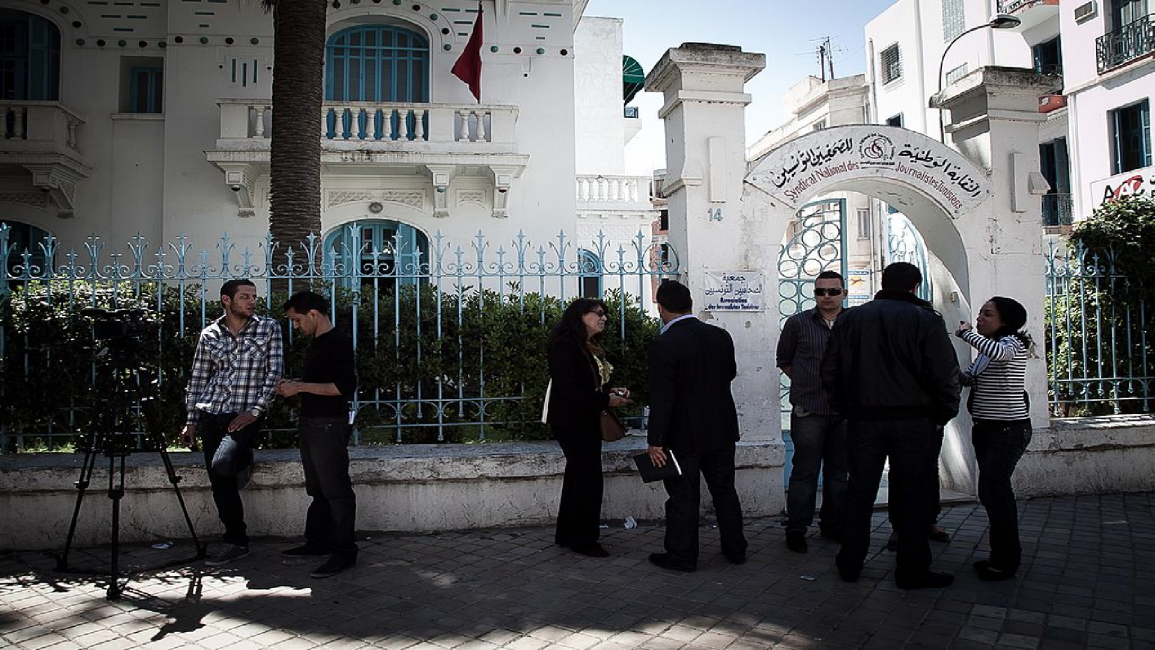Tunisia's National Union of Journalists rejects pro-Ben Ali figures attempt to control media
Tunisia's National Union of Journalists (SNJT) rejected Tuesday the soaring control of pre-revolution figures over state media, warning of the return of pro-state propaganda makers.
In a press release, the strong press union condemned rewarding "those who practised obfuscation and contributed to depriving the Tunisian people of their right to media before the revolution" with influential positions in media institutions today.
"These disgraceful practices strike at the principles of the revolution and represent a betrayal to the blood of the martyrs," added the press union.
The SNJT's communiqué was released a few hours after the appointment of Najeh Missaoui as head of the state news agency TAP was made public.
Missaoui was editor-in-chief of state TV during the Ben Ali era. Several activists and fellow journalists had accused Missaoui of fabricating anti-revolution content and receiving massive sums of money for his pro-Ben Ali propaganda.
After the revolution, Missaoui confirmed the accusations to local media. However, he argued that he was under pressure from the Ben Ali regime, which had significant control over the state media.
In the same press release, SNJT voiced support for journalist Jihane Alouane who announced her 'exclusion' from the state Tunisian Radio last week after four years of hosting the political program "Today's News".
SNJT said Alounae was punished for her "attachment to her professionalism and her refusal to engage in the system of propaganda."
Tunisia Radio has yet to officially announce the reasons behind its decision against Alouane.
The SNJT blamed President Kais Saied for "rejecting all requests and proposals for reforming the media sector", and "considering the media as mere megaphones used to spread disinformation and deprive citizens of their right to information".
Since his power grab in June 2021, President Saied has maintained tense ties with the Tunisian media as he seemed to label all critics and opposition as "traitors of the state."
Rights groups have expressed grave alarm at a crackdown on opposition figures and the media in Tunisia in which ten public figures were arrested only last month as President Kais Saied seemingly moves to stamp out dissent.
Saied hit back at the criticism, saying in a video posted on the presidency's Facebook page in February, "Has a single newspaper been shut down? Has a single programme been banned? Has a single journalist been prosecuted for anything relating to journalism?"
Last month, police raided the home of Noureddine Boutar, the head of Mosaique FM, one of Tunisia's largest and most popular independent radio stations.
He faces money laundering and "illicit enrichment" charges, but his detainment has been denounced as an attempt to intimidate journalists critical of the government.
According to Boutar's lawyers, police questioning focused on the station's editorial policy rather than the suspicion of legal wrongdoing.
"[Boutar's] arrest is an attempt to intimidate the whole sector," the SNJT's director, Mahdi Jlassi, told reporters during a supportive protest of Boutar last month.


![President Pezeshkian has denounced Israel's attacks on Lebanon [Getty]](/sites/default/files/styles/image_684x385/public/2173482924.jpeg?h=a5f2f23a&itok=q3evVtko)



 Follow the Middle East's top stories in English at The New Arab on Google News
Follow the Middle East's top stories in English at The New Arab on Google News


